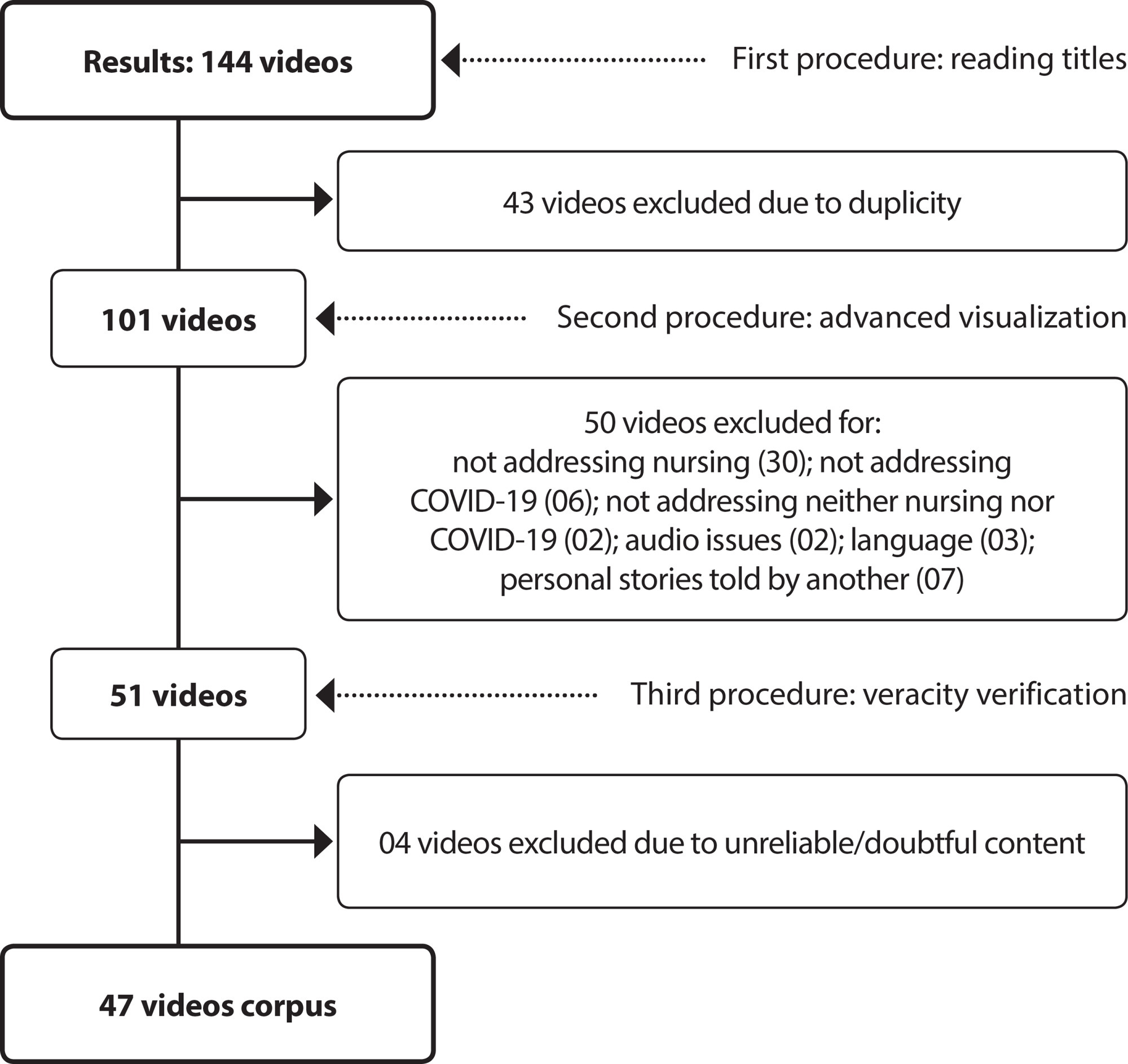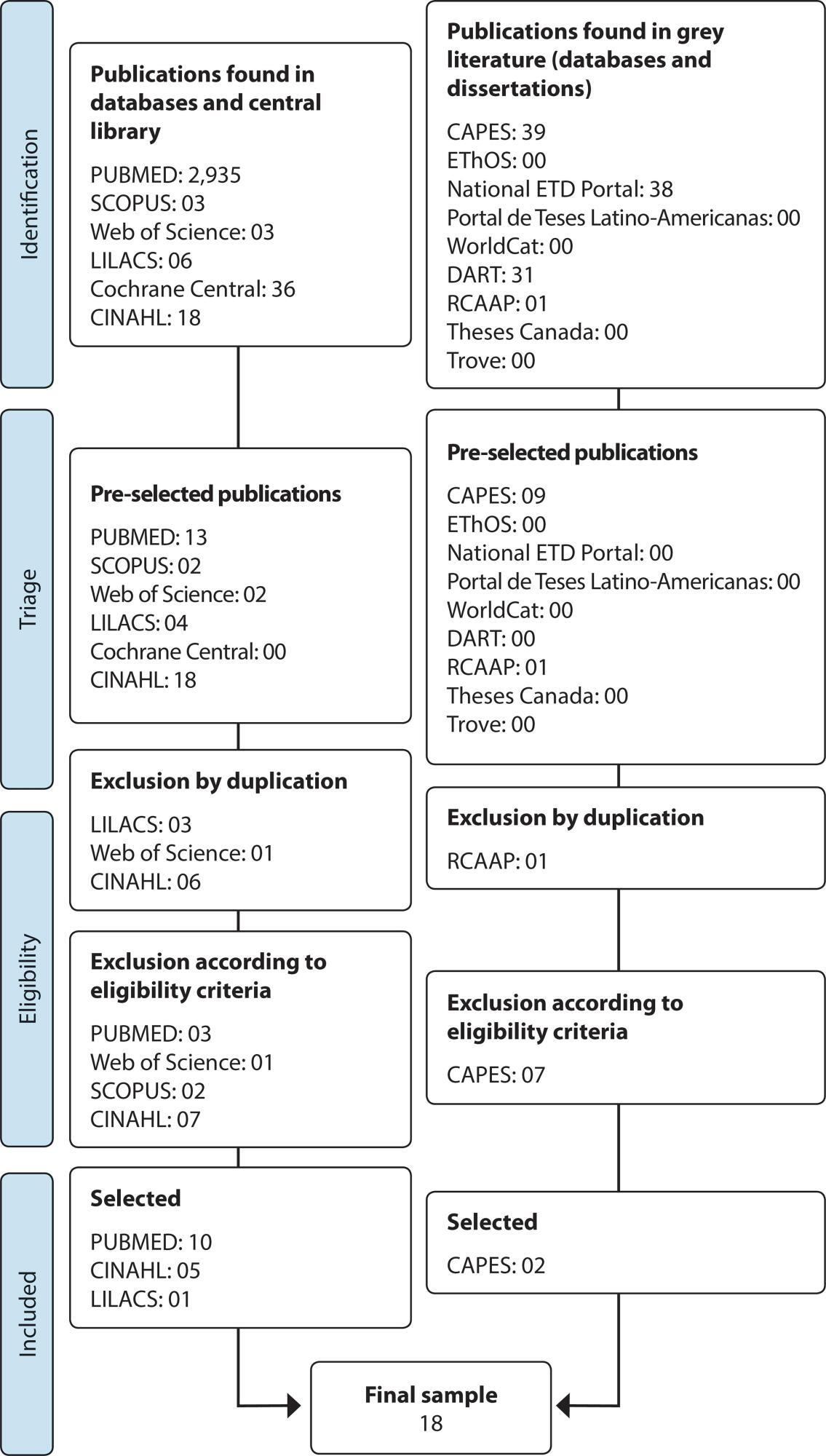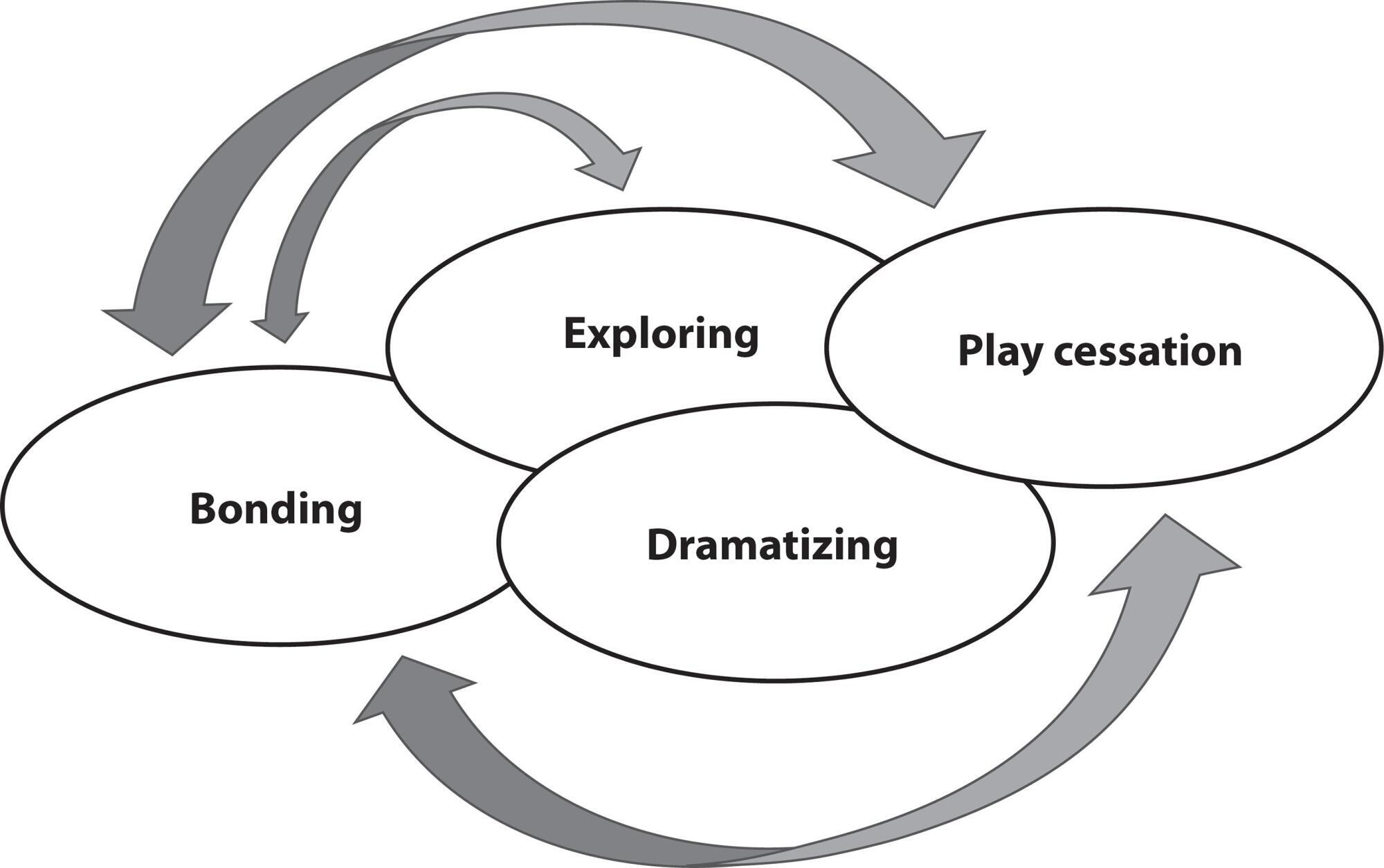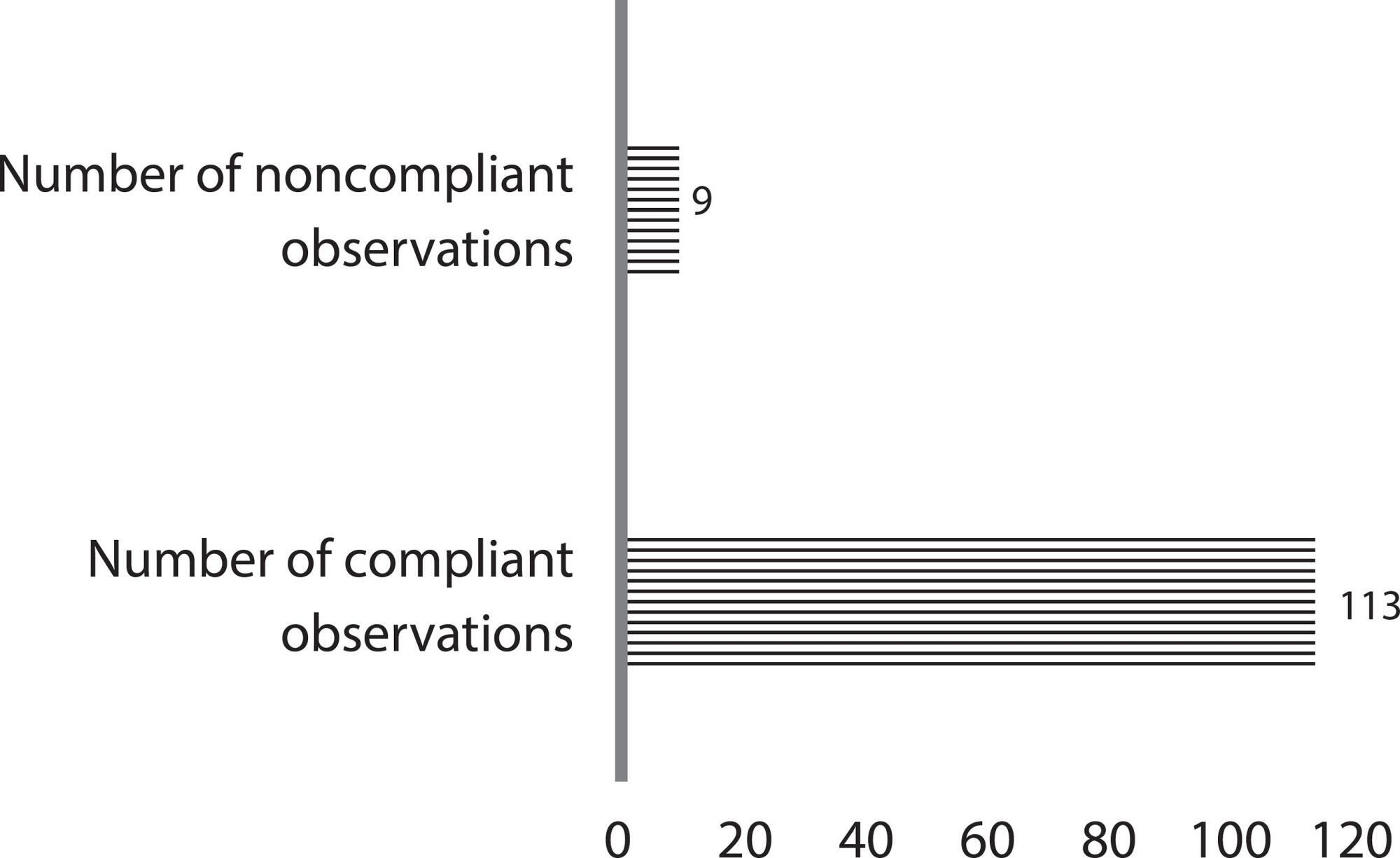-
ORIGINAL ARTICLE05-29-2023
Risk of violence and frailty syndrome among older adults treated at a hospital service
Revista Brasileira de Enfermagem. 2023;76:e20220278
Abstract
ORIGINAL ARTICLERisk of violence and frailty syndrome among older adults treated at a hospital service
Revista Brasileira de Enfermagem. 2023;76:e20220278
DOI 10.1590/0034-7167-2022-0278
Views0See moreABSTRACT
Objectives:
to assess the association between risk of violence and frailty syndrome among hospitalized older adults.
Methods:
quantitative, analytical and cross-sectional research, carried out with older adults in two university hospitals. Data collection was performed using the Brazil Old Age Schedule, Hwalek-Sengstock Elder Abuse Screening Test and Edmonton Frail Scale instruments. It was analyzed using descriptive statistics and inferential statistics.
Results:
risk of violence was higher among women (68.9%), over 70 years old (64.7%), with more than 3 years of study (68.9%), without relationship (67.1%), who do not work (65.1%) and with income above 1 minimum wage (65.2%). There is a significant association between risk of violence and frailty (72.3%; p<0.001) and a positive correlation between the instrument scores (r=0.350; p-value<0.001).
Conclusions:
risk of violence was associated with being female and frailty. The study is expected to encourage further discussions related to the theme and nursing practice.
-
05-29-2023
Absenteeism in child health services: a systematic review
Revista Brasileira de Enfermagem. 2023;76:e20210805
Abstract
Absenteeism in child health services: a systematic review
Revista Brasileira de Enfermagem. 2023;76:e20210805
DOI 10.1590/0034-7167-2021-0805
Views0See moreABSTRACT
Objectives:
to analyze data from qualitative studies related to the phenomenon of health follow-up dropout of newborns, infants and preschoolers in child health services.
Methods:
systematic review, carried out in 19 information bases. Studies were included that portray the reasons for dropping out health follow-up of children up to five years old. The JBI methodology was used for systematic reviews of qualitative evidence.
Results:
we identified 20,199 studies. After applying the eligibility criteria, 81 were selected. Seven were excluded due to duplicity, resulting in 74 articles that were read in full. After this phase, three articles were selected for the final sample and later after reading their references, one more was included, totaling four articles for critical analysis.
Conclusions:
the synthesized findings highlight that health follow-up dropout is based on personal knowledge and beliefs, the family routine dynamics and access to services.

-
ORIGINAL ARTICLE05-29-2023
Violence in rural areas against disabled people from the perspective of their families
Revista Brasileira de Enfermagem. 2023;76:e20220404
Abstract
ORIGINAL ARTICLEViolence in rural areas against disabled people from the perspective of their families
Revista Brasileira de Enfermagem. 2023;76:e20220404
DOI 10.1590/0034-7167-2022-0404
Views0See moreABSTRACT
Objectives:
to know the violence spoken and felt by disabled people, living in rural areas, from the perspective of their families.
Methods:
a descriptive-exploratory and qualitative study, carried out in four municipalities in Rio Grande do Sul, Brazil. Twelve family members who lived with disabled people in rural areas participated. Data were collected through semi-structured interviews and analyzed using thematic content analysis.
Results:
disabled people, living in rural areas, experienced physical, psychological and sexual violence, perpetrated by family members, colleagues, community members and health professionals. Adaptations were mentioned in family dynamics for the care of disabled people, social, financial and leisure impacts, and challenges in access and accessibility to education and health services.
Final Considerations:
violence against this population manifests itself in a reality with socioeconomic and family particularities, marked by exclusion, disrespect and denial of rights and access to fundamental goods and services.

-
ORIGINAL ARTICLE05-29-2023
Quality of life from women’s perspective in the exercise of sex work: a study of social representations
Revista Brasileira de Enfermagem. 2023;76:e20220169
Abstract
ORIGINAL ARTICLEQuality of life from women’s perspective in the exercise of sex work: a study of social representations
Revista Brasileira de Enfermagem. 2023;76:e20220169
DOI 10.1590/0034-7167-2022-0169
Views1See moreABSTRACT
Objectives:
to analyze the social representations elaborated by sex workers from Alto Sertão Produtivo Baiano about quality of life.
Methods:
a qualitative study, based on the Social Representation Theory, carried out in the region of Alto Sertão Produtivo Baiano, with 30 sex workers. Individual in-depth interview was carried out, with speeches organized in a corpus and treated in IRAMUTEQ, enabling lexical analysis for Descending Hierarchical Classification.
Results:
four thematic classes emerged, in which social representations of quality of life pervade: money earned to supply needs; association with healthy living and obtaining health (physical and mental); balance of emotions (although there are some negative sensations such as fear and anxiety); and faith in a deity.
Final Considerations:
the social representations elaborated by sex workers about quality of life are anchored in concepts, subjective and practical, punctuated by the World Health Organization.

-
ORIGINAL ARTICLE05-12-2023
Humanized care in the Intensive Care Unit: discourse of Angolan nursing professionals
Revista Brasileira de Enfermagem. 2023;76(2):e20220474
Abstract
ORIGINAL ARTICLEHumanized care in the Intensive Care Unit: discourse of Angolan nursing professionals
Revista Brasileira de Enfermagem. 2023;76(2):e20220474
DOI 10.1590/0034-7167-2022-0474
Views0See moreABSTRACT
Objectives:
to analyze the perception of nursing professionals in an intensive care unit in Angola about humanized care and identify resources necessary for its implementation.
Methods:
a qualitative, descriptive study conducted with 15 professionals in June-October/2020 in intensive care unit in Angola. The data were collected through semi-structured interviews; analysis based on the collective subject discourse technique.
Results:
five central ideas emerged: three related to the perception of humanized care (“From integral vision and empathy to a set of actions in all phases of care”, “Humanizing is extending care to family members and companions”, “Humanized care requires the establishment of a bond of trust and guarantee of individualized care”); and two on the resources necessary for this care (“Need for infrastructure – human and material resources”, “Professional training and humanized care are interconnected”).
Final Considerations:
humanized care involves objectivity and subjectivity; it includes family members. An adequate infrastructure can provide it.
-
ORIGINAL ARTICLE05-12-2023
Preceptorship contributions to the development of clinical and managerial skills in nursing residency
Revista Brasileira de Enfermagem. 2023;76(2):e20220510
Abstract
ORIGINAL ARTICLEPreceptorship contributions to the development of clinical and managerial skills in nursing residency
Revista Brasileira de Enfermagem. 2023;76(2):e20220510
DOI 10.1590/0034-7167-2022-0510
Views0See moreABSTRACT
Objectives:
to analyze the experience of resident nurses with preceptorship contributions to the development of common clinical and managerial skills acquired in pedagogical projects.
Methods:
exploratory qualitative research developed in two stages: document analysis of pedagogical projects and semi-structured interviews with residents. Content analysis was carried out based on the framework of the nurse’s work process and skills.
Results:
the pedagogical projects of the three programs foresee the development of common skills, mostly clinical and only two managerial skills. The 22 residents reported the contributions of preceptorship in the development of competences centered on clinical practice, focusing on technical procedures disjointed from clinical reasoning and the managerial dimension of the nurse’s work.
Final Considerations:
it is necessary to train preceptors and involve all social actors linked to residency programs to expand preceptorship potential.
-
ORIGINAL ARTICLE05-12-2023
The history of obstetric nurses’ professional training of in Minas Gerais (1957-1999): a genealogical analysis
Revista Brasileira de Enfermagem. 2023;76(2):e20220459
Abstract
ORIGINAL ARTICLEThe history of obstetric nurses’ professional training of in Minas Gerais (1957-1999): a genealogical analysis
Revista Brasileira de Enfermagem. 2023;76(2):e20220459
DOI 10.1590/0034-7167-2022-0459
Views0See moreABSTRACT
Objectives:
to analyze obstetric nurses’ professional training in Minas Gerais between 1957 and 1999, according to genealogical principles.
Methods:
a qualitative interpretative study based on historical research with genealogical analysis. Data were obtained through documentary research and oral history, with six participants, and submitted to discourse analysis.
Results:
they recompose the genealogical path of obstetric nurses’ professional training from Minas. The speeches reveal field of practice deprivation in professional training and the importance of the articulation between the Universidade Federal de Minas Gerais Nursing School and Hospital Sofia Feldman for teaching and work in obstetric nursing. It was identified that training, in the national scenario, evolved from a Escola de Enfermagem Carlos Chagas’ peripheral initiative to centrality and capillarity.
Final Considerations:
the unique historical trajectory of obstetric nurses’ professional training in Minas Gerais, marked by ruptures, institutional articulations, conflicting games and interest, was unveiled.
-
ORIGINAL ARTICLE05-08-2023
Factors associated with demand for emergency medical services by people with hypertension and diabetes
Revista Brasileira de Enfermagem. 2023;76(2):e20220147
Abstract
ORIGINAL ARTICLEFactors associated with demand for emergency medical services by people with hypertension and diabetes
Revista Brasileira de Enfermagem. 2023;76(2):e20220147
DOI 10.1590/0034-7167-2022-0147
Views0See moreABSTRACT
Objectives:
to analyze the association between recurrence of emergency service visits due to lack of blood pressure and/or glycemic control with sociodemographic variables and disease registration in Primary Care.
Methods:
quantitative study, which consulted medical records of people who attended these services two or more times for 26 months. Descriptive statistics and multiple logistic regression models were used in analysis.
Results:
most people did not have hypertension and/or diabetes record in their Primary Care records. The absence of this record was more frequent in males, aged between 18 and 59 years, with low education and lack of blood pressure. There was association between greater number of people seeking these services in the same year and not monitoring the chronic condition in specialized care.
Conclusions:
people who do not follow up hypertension and/or diabetes in Primary Care are more likely to need assistance due to blood pressure and/or glycemic management.
-
02-05-2021
Contents related to nursing professionals during the COVID-19 pandemic on the Youtube™ platform
Revista Brasileira de Enfermagem. 2021;74:e20200581
Abstract
Contents related to nursing professionals during the COVID-19 pandemic on the Youtube™ platform
Revista Brasileira de Enfermagem. 2021;74:e20200581
DOI 10.1590/0034-7167-2020-0581
Views0See moreABSTRACT
Objective:
to characterize the content of Youtube™ videos related to nursing professionals during the COVID-19 pandemic.
Method:
a qualitative study that examined 47 videos on Youtube™ posted between 11/03 and 11/04 2020, which were subjected to thematic analysis.
Results:
four categories emerged: “the role of nurses in care production during the pandemic”, which addresses the management of services and individual care; “Overview of the pandemic from the perspective of nurses in different countries”, presenting experiences and encouraging physical distance; “Tributes and motivation to mobilize the category”, in addition to targeted tributes, calls for nurses to claim their rights; “Criticisms and demands to improve working conditions”, which highlights the insecurity of care provision settings.
Final considerations:
nursing work conditions in different countries, recognition of the importance of professionals during the pandemic, and claims of the category to improve working conditions were the main content found on Youtube™.

-
REVIEW07-13-2020
Prevention and control measures for neonatal COVID-19 infection: a scoping review
Revista Brasileira de Enfermagem. 2020;73:e20200467
Abstract
REVIEWPrevention and control measures for neonatal COVID-19 infection: a scoping review
Revista Brasileira de Enfermagem. 2020;73:e20200467
DOI 10.1590/0034-7167-2020-0467
Views0See moreABSTRACT
Objective:
to identify with the literature the measures to prevent and control neonatal infection by COVID-19.
Methods:
a scope review carried out by searching for studies in databases and institutional health websites. The final sample was 25 articles.
Results:
among the main measures are the use of masks by suspected or infected people in contact with healthy newborns, hand hygiene before and after each care and feeding as well as the tools used for milking. It is indispensable to use personal protective equipment by health professionals in neonatology services to maintain a private room for infected newborns or to use physical barriers. Early diagnosis and timely case management is essential to reduce virus transmissibility.
Conclusions:
the research contributed to elucidate health and nursing actions in preventing and controlling neonatal infection by COVID-19.

-
REVIEW06-17-2020
Prevention and conduct against the Extravasation of antineoplastic chemotherapy: a scoping review
Revista Brasileira de Enfermagem. 2020;73(4):e20190008
Abstract
REVIEWPrevention and conduct against the Extravasation of antineoplastic chemotherapy: a scoping review
Revista Brasileira de Enfermagem. 2020;73(4):e20190008
DOI 10.1590/0034-7167-2019-0008
Views0See moreABSTRACT
Objectives:
to identify and synthesize scientific evidence on prevention and management of extravasation of antineoplastic agents in adult patients by nurses.
Methods:
scoping review, according to Joanna Briggs Institute and PRISMA-ScR. Research was conducted in five electronic databases, Cochrane Library and eight catalogs of theses and dissertations. Data collection occurred from April to July 2018, with no time limit. The extracted data were analyzed and synthesized in a narrative way.
Results:
a total of 3,110 records were retrieved and 18 studies were kept for review. Most publications (66.6%) had a qualitative approach and addressed both aspects, i.e., prevention and management of extravasation of chemotherapy in adult patients.
Conclusions:
the implementation of protocols based on scientific evidence on prevention and management of extravasation of antineoplastic agents is paramount in order to provide patient safety and support to the nursing staff.

-
REFLECTION09-07-2020
Training and work process in Multiprofessional Residency in Health as innovative strategy
Revista Brasileira de Enfermagem. 2020;73(6):e20190635
Abstract
REFLECTIONTraining and work process in Multiprofessional Residency in Health as innovative strategy
Revista Brasileira de Enfermagem. 2020;73(6):e20190635
DOI 10.1590/0034-7167-2019-0635
Views0See moreABSTRACT
Objectives: To
reflect about education in health and work process on three programs of multiprofessional residency in Florianópolis/SC.
Method:
Reflexive study about Multiprofessional Residency Health Programs of Florianópolis.
Results:
Multiprofessional Residency characterizes training health professionals through service education. Developing these professionals’ specialization with assignments that promote professional exercise and magnifies multiprofessional work at the same time, for excellency in unabridged healthcare.
Final Considerations:
Multiprofessional Residency Programs make interdisciplinary education, sharing knowledge between residents and other professionals stimulating development of innovation skills.
-
ORIGINAL ARTICLE06-08-2020
Understanding the dramatic therapeutic play session: a contribution to pediatric nursing
Revista Brasileira de Enfermagem. 2020;73(4):e20180812
Abstract
ORIGINAL ARTICLEUnderstanding the dramatic therapeutic play session: a contribution to pediatric nursing
Revista Brasileira de Enfermagem. 2020;73(4):e20180812
DOI 10.1590/0034-7167-2018-0812
Views0See moreABSTRACT
Objectives:
to understand how the dramatic therapeutic play session occurs within the care of hospitalized children.
Methods:
qualitative multiple case study, using theoretical references, such as symbolic interactionism and Vygotsky’s theory of symbolic play. Twenty play sessions performed with six children from 3 to 10 years old were analyzed, each corresponding to one case.
Results:
these sessions demonstrated that a dramatic therapeutic play session is a process of four interdependent and complementary steps: bonding, exploring, dramatizing, and play cessation. They also revealed the imaginary situations externalized by the child, the importance of the exploration step for which they manage the imaginary situation and catharsis, and how her higher psychological faculties are articulated during this process.
Final Considerations:
the results contribute to the understanding of the conduct and analysis of the dramatic therapeutic play session, reinforcing the importance of its use in pediatric nursing care practice.

-
ORIGINAL ARTICLE02-10-2020
Motivation and difficulties to reduce or quit smoking
Revista Brasileira de Enfermagem. 2020;73(1):e20180188
Abstract
ORIGINAL ARTICLEMotivation and difficulties to reduce or quit smoking
Revista Brasileira de Enfermagem. 2020;73(1):e20180188
DOI 10.1590/0034-7167-2018-0188
Views0See moreABSTRACT
Objective:
To understand what factors motivate people to reduce or stop tobacco use and what difficulties they face in this process.
Method:
Qualitative, empirical and interpretative research that used a focal group technique for data collection and Discourse Analysis as a theoretical reference for analysis.
Results:
The responses centered on the following aspects: motivation for reduction or cessation of smoking, family and community support received during treatment, benefits from cessation of tobacco, difficulties encountered and strategies for overcoming triggers.
Final Considerations:
The results showed that the users expressed their desire for cessation of tobacco use and that to achieve this goal, family and group support, professional help and changing habits are key factors for this process.
-
ORIGINAL ARTICLE02-10-2020
Common mental disorders in nursing students of the professionalizing cycle
Revista Brasileira de Enfermagem. 2020;73(1):e20180154
Abstract
ORIGINAL ARTICLECommon mental disorders in nursing students of the professionalizing cycle
Revista Brasileira de Enfermagem. 2020;73(1):e20180154
DOI 10.1590/0034-7167-2018-0154
Views0See moreABSTRACT
Objectives:
to verify the suspicion of common mental disorders in nursing students of the professionalizing cycle and the association with sociodemographic features.
Method:
cross-sectional study with a sample of 85 students from a public university in the state of Rio de Janeiro (RJ) who responded to the Self-Report Questionnaire-20 and sociodemographic questions.
Results:
the suspicion prevalence of common mental disorders (CMD) in the sample was 55.3% and it was identified the association with the consumption of alcohol. Of the most frequent SRQ-20 complaints, 95.3% reported “feeling nervous, tense or worried”, 72.9% “having difficulty making decisions”, 60% “sleeping poorly” and 37.6% “having lost interest by things “.
Conclusion:
high prevalence of CMD in the sample and the association with the consumption of alcohol requires preventive and therapeutic actions among the students that minimize the possibility of severe mental disorders related to the consumption of alcohol and other drugs.
-
ORIGINAL ARTICLE06-27-2019
Insertion of central vascular catheter: adherence to infection prevention bundle
Revista Brasileira de Enfermagem. 2019;72(3):774-779
Abstract
ORIGINAL ARTICLEInsertion of central vascular catheter: adherence to infection prevention bundle
Revista Brasileira de Enfermagem. 2019;72(3):774-779
DOI 10.1590/0034-7167-2018-0124
Views0See moreABSTRACT
Objective:
To evaluate the compliance of the care process involving insertion of central vascular catheter (CVC) in hemodialysis.
Method:
Cross-sectional quantitative approach developed at the hemodialysis service of a reference hospital in Sergipe, Brazil. Sample consisting of 1,342 actions evaluated, corresponding to 122 forms for monitoring and control of CVC insertion. Data collection was held from July to December 2016.
Results:
The adherence rate to the use of the insertion form was 54.9%. The procedure evaluated achieved 93% overall compliance. Of the 11 specific actions observed, seven (64%) presented 100% compliance. The density of the overall incidence of primary bloodstream infections reduced from 10.6 to 3.1 infections per 1,000 patients/day.
Conclusion:
Although the observed actions reached specific desired conformities, the use of the checklist was lower than expected. Strategies for monitoring, coaching and educational and organizational actions can contribute to safe care.

Search
Search in:
Nuvem de Tags
Adolescente (85) Atenção Primária à Saúde (239) COVID-19 (91) Criança (91) Cuidados de Enfermagem (269) Educação em Enfermagem (151) Educação em Saúde (139) Enfermagem (930) Enfermagem Pediátrica (86) Estudantes de Enfermagem (77) Estudos de Validação (131) Família (87) Idoso (208) Promoção da Saúde (99) Qualidade de Vida (104) Saúde do Trabalhador (86) Saúde Mental (145) Saúde Pública (82) Segurança do Paciente (150) Tecnologia Educacional (100)



